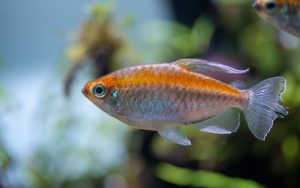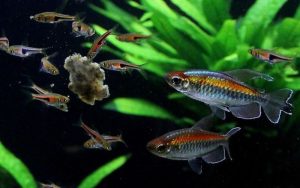When setting up a community aquarium, one common question is whether bettas and guppies can live in the same tank peacefully. Both guppies and bettas are popular choices for aquarium enthusiasts, each with unique characteristics. So, can guppies live with bettas in the same tank?
While they can coexist under the right conditions, it’s essential to consider a few factors to ensure a peaceful and harmonious tank.
This article will explore six easy tips to successfully keep guppies and bettas together, promoting a thriving aquatic environment.

Keeping a harmonious community tank requires careful consideration of the fish species involved. Guppies (35-78) and bettas (19-34) are known for their vibrant colors and captivating personalities, making them popular among aquarium enthusiasts.
This article will explore the possibility of keeping these two species together and provide valuable tips to ensure a peaceful coexistence.
Table of Contents
ToggleUnderstanding Guppies and Bettas
Guppies: The Colorful Omnivores
Guppies are small, tropical freshwater fish native to South America. They are known for their striking colors and lively personalities. Guppies (1-2) are omnivores, feeding on a varied diet of plant matter and tiny organisms. They are generally peaceful and enjoy swimming in groups, making them excellent additions to community tanks.
Bettas: The Beautiful Fighters
Bettas, also known as Siamese fighting fish, originate from Southeast Asia. Male bettas (1-4) are renowned for their vibrant colors and impressive fin displays. However, it’s important to note that male bettas can be aggressive toward their species and other fish with long, flowing fins. On the other hand, female bettas (1-5) tend to be less aggressive and can coexist with other peaceful fish.
Can Guppies Live with Bettas Safely?
Can guppies go with betta fish? The answer to whether guppies and bettas can live together is yes but with specific considerations. In reality, it’s recommended only to house one betta fish alongside your group of guppies.
Successfully housing these two types of fish species in the same tank requires careful planning and adherence to the following tips:
7 Simple Steps for Creating the Ideal Tank Environment
1. Tank Size and Setup
A minimum tank size of 10 gallons of water (1) is recommended to provide adequate space for both guppies and bettas. A larger tank offers more swimming space and reduces the likelihood of territorial conflicts. The tank should be adequately cycled and equipped with a heater and filter to maintain stable water conditions.
2. Water Parameters
Both guppy fish and betta prefer similar water parameters. The ideal water temperature ranges from 75°F to 82°F (3-10), with a pH between 6.8 and 7.5. Conduct regular water tests and perform water changes as necessary to keep the tank environment pristine.
3. Tank Mates and Compatibility
When choosing tank mates for guppies and bettas, it’s crucial to consider their compatibility. Avoid pairing guppies with bettas that have long, flowing fins, as they may be mistaken for rival males, triggering aggression. Instead, opt for small, peaceful fish species (1-3) compatible with guppies and bettas.
4. Providing Hiding Places
Creating ample hiding places in the tank is essential to help reduce stress and provide refuge for fish. Live plants (1-4), such as Java moss or Amazon sword plants, add aesthetic value and serve as natural hiding spots for both guppies and bettas. Decorations like driftwood, caves, and rocks can provide additional hiding places.
5. Feeding Considerations
Ensure a balanced diet for guppies and bettas to support their health and vitality. Guppies are omnivores (1) and require a combination of high-quality flake food, freeze-dried or frozen foods, and occasional live foods. Bettas can be fed a specialized pellet or flake diet formulated for betta fish live, supplemented with occasional treats like bloodworms or brine shrimp.
6. Maintaining Water Quality
Regular maintenance is essential for the well-being of your brightly colored fish. Perform weekly water changes of around 20% to 25% of the tank volume to remove accumulated toxins and maintain optimal water quality. Clean the filter regularly, following the manufacturer’s instructions.
7. Monitoring Behavior and Compatibility
Keep a close eye on the behavior of both guppies and bettas when they are introduced into the same tank. Monitor for signs of aggression, such as fin-nipping or chasing. If an attack becomes an issue, separating the fish into different tanks or utilizing a tank divider (1) to provide a physical barrier may be necessary.
Note: The good news is that adult guppies are generally too large for bettas to consume. However, it’s important to note that guppies breed rapidly, and their offspring, known as Guppy fry, are a tasty snack for bettas.
Bettas and Guppies Troubleshooting Common Issues
In some cases, conflicts may arise between guppies and bettas despite careful planning. If persistent aggression or stress is observed, consider the following steps:
- Separate the aggressive fish into a separate tank or utilize a divider (1).
- Provide additional hiding places or rearrange the fish tank setup to reduce territorial disputes.
- Adjust the feeding your betta and guppy fish routine to ensure all fish receive sufficient food without triggering competition.
How can I keep guppies and bettas together, Safely?
Here are six easy tips to keep bettas and guppies together in the same tank:
- Provide ample hiding spaces for both guppies and bettas. This can be done by adding live plants, caves, or decorations to the tank.
- Keep the tank well-maintained and clean to prevent potential diseases or parasites from affecting the fish.
- Make sure to feed your guppies and bettas separately. Bettas are carnivorous and require a high-protein diet, while guppies are omnivorous and eat both meat and plants.
- Consider the size of the tank. A 10-gallon tank is recommended to provide enough space for both fish to thrive.
- Introduce the guppies to the tank first and allow them to establish their territory before adding the betta. This can help reduce aggression towards the guppies.
- Monitor the behavior of both fish closely. If any signs of aggression or stress are observed, separate them immediately.
Guppy and Betta Fish Commonly Asked Questions (FAQs)
Can guppies live with bettas in a small tank?
Can betta fish live with guppies in small fish tanks? While it is possible to house guppies and bettas in a small tank, providing a minimum tank size of 10 gallons is generally recommended to ensure sufficient space for both species to thrive.
What other fish can be kept with guppies and bettas?
Smaller fish species compatible with guppies and bettas include neon tetras, platies, corydoras catfish, and small varieties of rasboras and danios.
Can female bettas live with guppies?
Female bettas are generally less aggressive than their male counterparts and can coexist with guppies and other peaceful fish. However, it’s essential to ensure ample hiding places and space for each fish to avoid conflicts.
Do guppies and bettas eat the same food?
Can Guppies eat betta food? Guppies and bettas have slightly different dietary requirements. Guppies are omnivores and need a varied diet consisting of high-quality flake, freeze-dried, frozen, and occasional live foods. On the other hand, bettas have specialized diets and can be fed betta-specific pellets or flakes supplemented with treats like bloodworms or brine shrimp. It’s essential to provide appropriate nutrition for each species.
Can guppies and bettas breed together?
No, guppies and bettas cannot breed together. They are two distinct species with different breeding behaviors and requirements. Attempting to produce them together will not result in viable offspring.
How many guppies and bettas can be kept together in a tank?
The number of guppies and bettas that can be kept together depends on the tank size and the compatibility of the individual fish. As a general guideline, it’s recommended to have a ratio of one male betta to a group of female guppies to minimize aggression. However, ensuring the tank is spacious enough to accommodate all the fish comfortably is crucial.
Can guppies live with bettas?
Yes, guppies can live with bettas. However, there are specific considerations to consider to ensure a peaceful tank environment.
Can guppies and bettas be kept together without any issues?
While guppies and bettas can live peacefully together, it is essential to remember that each fish may have its temperament. Some bettas may be more aggressive and territorial, leading to conflicts with guppies. Therefore, observing their behavior closely and being prepared to separate them if necessary is always recommended.
Do guppies and bettas eat the same food?
No, guppies and bettas do not eat the same based food. Bettas are carnivorous and require a protein-rich diet, while guppies are omnivorous and eat meat and plants. Providing separate food for each species is essential to ensure they receive the necessary nutrients.
Are guppies and bettas compatible tank mates?
Guppies and bettas can be compatible tank mates if certain precautions are taken. Providing enough hiding spaces, maintaining a clean tank, and closely monitoring their behavior ensure peaceful coexistence between these two fish species.
Can guppies live with betta fry?
It is generally not recommended to keep guppies with betta fry. Guppies are known to be opportunistic and may prey on the fry. It is best to separate the fry from the guppies to ensure their survival and growth.
Can guppies live with live plants in the same tank as bettas?
Guppies can live with live plants in the same tank as bettas. Live plants provide hiding places for both bettas and guppies and contribute to the tank’s overall health by improving water quality and oxygenation.
What other fish breeds can be kept with guppies and bettas?
Besides guppies and bettas, other fish breeds can be compatible tank mates, such as small tetras, rasboras, and danios. It is vital to research each fish species’ specific needs and compatibility before introducing them to the tank.
How many guppies and bettas can be kept together in a tank?
The number of guppies and bettas that can be kept together in a tank depends on the size of the tank. As a general guideline, a 10-gallon tank can accommodate 2-4 bettas and a small group of guppies. It is important to avoid overcrowding the tank to maintain a healthy and stress-free tank environment for the fish.
Can I keep male guppies with female bettas?
While it is possible to keep male guppies with a female betta, it is crucial to consider the betta’s temperament and the tank mates’ compatibility. Female bettas are generally less aggressive than males, but each fish may have its personality. It is essential to closely monitor their attitude and be prepared to separate them if necessary.
Can Guppies Live with Male Bettas?
Male bettas, in particular, are notorious for their aggressive behavior, constantly fighting for dominance and territory in the wild. For this reason, it’s generally recommended to keep guppies with a female betta instead of a male to avoid conflicts in the aquarium.
Conclusion
In conclusion, guppies and bettas can live together harmoniously if specific guidelines are followed. By creating an ideal tank environment, considering compatibility, and monitoring behavior, you can enjoy the captivating beauty of both species in a single aquarium. Remember to provide adequate space, hiding places, and a well-balanced diet for the fish’s overall well-being. Your bettas and guppies can thrive together with proper care and attention, creating a visually stunning and peaceful tank. Now that you comprehensively understand keeping guppies and bettas together, you can create a vibrant and friendly community tank.
Remember to consider the needs of both species, provide appropriate hiding places, and closely monitor their behavior. By following these tips, you can enjoy the beauty of guppies and bettas coexisting harmoniously in your aquarium.
You might also like
- How Many Guppies in a 3 Gallon Tank? (Comprehensive Guide)
- Can Guppies Eat Betta Food: Why Not & (5 Best Alternatives)
- How Many Guppies in a 10 Gallon Tank: Solved & Explained
- 7 Proven Ways to Stop Aggressive Guppy Fish in Their Tracks
- Koi Guppy Fish Price, Size, and Different Types (Solved)
- Rare Guppy Fish Species: A Fascinating World Below Surface
- Do Guppies Need a Filter: 3 Key Benefits of Using a Filter!
- How Long Can Guppy Survive Without Food: (Solved & Explained)
- Can Angelfish Live with Guppies and Mollies: Shocking Revelation Revealed!
- Can Guppies Live in a Tank Without Filter: Here’s How to SAVE Them!
- Guppy Fin Rot or Nipping: 3 Key Differences You Should Know!
- Do Guppies Eat Shrimp: Discover the Surprising Harmony!
- Can Guppies and Shrimp Live Together: (The Shocking Truth)
- Can Tetras and Guppies Live Together in Harmony!




